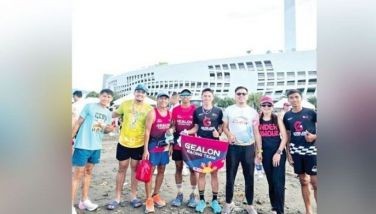How to win friends and influence people

The Philippines must compete with numerous countries and entities for the sustained attention of various key publics and decisions makers in the United States. The Philippines needs a response to this political reality of rival advocacies, clashing priorities and multiple agendas. As part of this response, the Philippines must develop as many platforms as possible from which to project a positive image of itself and of the Philippine-American alliance.
The Philippines already has some such platforms. Firstly, there is the Philippine Friendship Caucus on Capitol Hill. Second, there is the National Foundation of Filipino-American Associations (NaFFAA). Third, there is the periodic employment by the government of lobbyists and consultants. In addition, there are various Philippines-related chambers and the government and business works closely with the US-ASEAN Business Council.
Unfortunately, none of the existing mechanisms has the resources, the machinery or the mandate to maintain a sustained outreach program in the United States, specifically designed to build up the bilateral Philippines-American partnership. Though these existing mechanisms are important, each tend to be either episodic in action, or limited in agenda, or insufficiently funded and manned.
In particular, there is no platform outside of the Philippine Government and a handful of industry-specific groups that focuses on the promotion of what must be a key Philippine effort in the United States, namely, economic diplomacy. There should be a platform dedicated to ramping up discussions in the US capital on Philippine business conditions, on Phl-US economic linkages, on mutual Philippine-American interests in various fields and on broader aspects of Philippine society in ways that would be attractive to target American audiences.
Such a platform, moreover, should be seen as non-political. An organization established by the government would be suspect and could easily be hostage to the vagaries of politics in Manila.
It would seem that the best way to proceed would be for the private sectors of both countries to work together to create such a platform. Expanding economic ties would be its natural mission. And with enough support, a broader range of activities could be possible. If endorsers could be found to provide strong financial commitments, then a real presence could be cultivated in Washington, DC that would focus on what is important and unique in the US-Philippine relationship.
Ambassador Tom Hubbard and I discussed this concept during his visit in June of last year. We also discussed it with business leaders such as Manuel Pangilinan, Jaime Augusto Zobel, Ramon Ang, Tessie Sy-Coson and Ramon del Rosario Jr.
US-Philippines Society Inc.
Almost one year later and after the dogged determination of many as well as the assistance and moral support of our tireless Ambassador Jose L. Cuisia, Jr. in Washington, the Society’s office was opened in Washington, D.C. on May 1. The operating staff has Ambassador John F. Maisto as president and Hank Hendrickson as the executive director.
I was delighted to learn that President Aquino agreed to be the keynote speaker at the formal launching of the Society at the Mandarin Oriental in Washington, DC on June 7.
Allow me to quote portions from their official announcement: “The Society’s mission is to build on the rich and longstanding historical ties between the two nations and help to bring the unique relationship fully into the 21st century at a junction when US policy interests are increasingly focused on East Asia.”
“The Society is a private sector initiative designed to encourage economic ties, promote trade and investment, support bilateral strategic and political goals, and strengthen cultural, technological, tourism and people to people linkages, especially educational and academic exchanges. The Society is a non-profit organization, registered as a 501[c] 3 in Washington; its mandate is to be non-political, non- partisan, bilateral and independent. The Society will network with government officials but receives no funding or direction from either the US or Philippine government institutions.”
“Programming will reflect the Society’s underlying goal of drawing more attention to US-Philippine relations in Washington through a comprehensive approach, bringing together policy-makers, congressional leaders, think tank analysts, academics, cultural and artistic figures, and the media. The Society will also seize opportunities to undertake partner programs with established non-governmental organizations and academic and cultural institutions to increase public exposure to Philippine issues.”
“While corporate support will remain key to future success, the Society seeks to build a broad membership base, in part by targeting the growing community of four million Filipino Americans, many of whom are building successful professional careers. Membership opportunities will range from high end donors with an interest in participating as members of the board to regular and low cost student memberships.”
During the launch Ambassador Cuisia said: “The Society’s wide-ranging mission, with programs covering key areas in our 21st century Phl-US relationship………will capitalize on the US strategic pivot to Asia and compliment the Philippine government’s efforts to move forward in these same areas”.
The board
A key consideration here is that the messengers will be the message. The board membership must be well-established, credible and influential, as is manifested in the following paragraph.
The Society’s board is co-chaired by Ambassador John D. Negroponte (US) and Mr. Manuel V. Pangilinan (Phl). Honorary Chairs are Mr. Washington Z. Sycip and Mr. Maurice “Hank” Greenberg.
In addition to the co-chairs and honorary chairs, the other Founding Board Members are Jaime Augusto Zobel (Ayala Corp.), Enrique K. Razon Jr. (ICTSI), myself, Ambassador Thomas C. Hubbard (McLarty Associates), Robert A. McDonald (Procter & Gamble), Melody Meyer (Chevron), Cirilo P. Noel (SGV), Aurelio R. Montinola III (BPI), Dennis Wright (Peregrine), Jay Collins (Citigroup) and TeresitaSy-Coson (SM Investments). Board members also include Ramon del Rosario, Jr. (PHINMA), Doris Magsaysay-Ho (Magsaysay Shipping), Henry Howard (US Education Finance Group), Loida Nicolas Lewis (TLC ,Beatrice), Dado Banatao (Tallwood Venture Capital), Ambassador Karan K. Bhatia(GE), Bjorn Jensen (Coca Cola), and Emily Beizer (JP Morgan Chase).
Appeal
The US-Philippines Society Inc. must be supported not only in 2012 but on a sustained basis by the private sector and its membership. For those who have yet to pledge their support, I urge you to contact the Society or the Filipino board members.
- Latest
- Trending


























